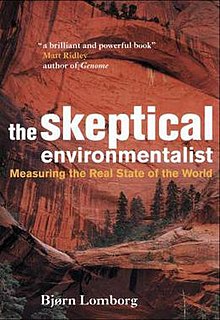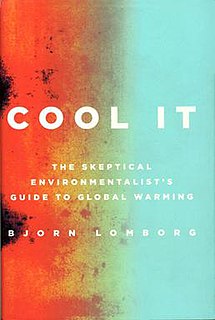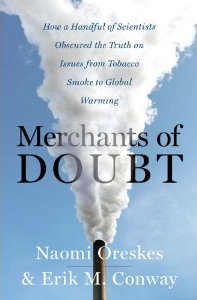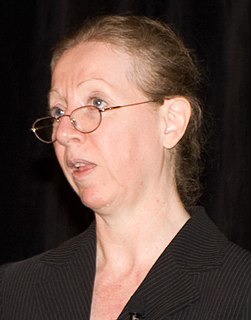Related Research Articles

Bjørn Lomborg is a Danish author and President of the think tank, Copenhagen Consensus Center. He is former director of the Danish government's Environmental Assessment Institute (EAI) in Copenhagen. He became internationally known for his best-selling and controversial book, The Skeptical Environmentalist (2001), in which he argues that many of the costly measures and actions adopted by scientists and policy makers to meet the challenges of global warming will ultimately have minimal impact on the world's rising temperature.
Environmental skepticism is the belief that statements by environmentalists, and the environmental scientists who support them, are false or exaggerated. The term is also applied to those who are critical of environmentalism in general. It can additionally be defined as doubt about the authenticity or severity of environmental degradation. Environmental skepticism is closely linked with anti-environmentalism and climate change denial.

The Skeptical Environmentalist: Measuring the Real State of the World is a book by Danish environmentalist author Bjørn Lomborg, controversial for its claims that overpopulation, declining energy resources, deforestation, species loss, water shortages, certain aspects of global warming, and an assortment of other global environmental issues are unsupported by statistical analysis of the relevant data. It was first published in Danish in 1998, while the English edition was published as a work in environmental economics by Cambridge University Press in 2001.

Julian Lincoln Simon was an American professor of business administration at the University of Maryland and a Senior Fellow at the Cato Institute at the time of his death, after previously serving as a longtime economics and business professor at the University of Illinois at Urbana-Champaign.
Gun politics is an area of American politics defined by two primary opposing ideologies about civilian gun ownership. People who advocate for gun control support increasing regulations related to gun ownership; people who advocate for gun rights support decreasing regulations related to gun ownership. These groups often disagree on the interpretation of laws and court cases related to firearms as well as about the effects of firearms regulation on crime and public safety. It is estimated that U.S. civilians own 393 million firearms, and that 35% to 42% of the households in the country have at least one gun. The U.S. has the highest estimated number of guns per capita, at 120.5 guns for every 100 people.

Gregg Edmund Easterbrook is an American writer and a contributing editor of both The New Republic and The Atlantic Monthly. He has authored ten books, and writes for op-ed pages, magazines, and journals.
Copenhagen Consensus is a project that seeks to establish priorities for advancing global welfare using methodologies based on the theory of welfare economics, using cost–benefit analysis. It was conceived and organized around 2004 by Bjørn Lomborg, the author of The Skeptical Environmentalist and the then director of the Danish government's Environmental Assessment Institute.

The George C. Marshall Institute (GMI) was a nonprofit conservative think tank in the United States. It was established in 1984 with a focus on science and public policy issues and was initially active mostly in the area of defense policy. Since the late 1980s, the institute put forward environmental skepticism views, and in particular promoted fringe views regarding the scientific consensus on climate change. The think tank received extensive financial support from oil companies.
The Danish Committees on Scientific Dishonesty are a set of three committees under the Danish Ministry of Research and Information Technology: a committee for natural science, agricultural and veterinary science and technical science; a committee for health and medical science; and a committee for social science and the humanities. They have a common chairman.
A global warming conspiracy theory invokes claims that the scientific consensus on global warming is based on conspiracies to produce manipulated data or suppress dissent. It is one of a number of tactics used in climate change denial to attempt to legitimize political and public controversy disputing this consensus. Conspiracy theorists typically allege that, through worldwide acts of professional and criminal misconduct, the science behind global warming has been invented or distorted for ideological or financial reasons.

Climate change denial, or global warming denial is denial, dismissal, or unwarranted doubt that contradicts the scientific consensus on climate change, including the extent to which it is caused by humans, its effects on nature and human society, or the potential of adaptation to global warming by human actions. Many who deny, dismiss, or hold unwarranted doubt about the scientific consensus on anthropogenic global warming self-label as "climate change skeptics", which several scientists have noted is an inaccurate description. Climate change denial can also be implicit when individuals or social groups accept the science but fail to come to terms with it or to translate their acceptance into action. Several social science studies have analyzed these positions as forms of denialism, pseudoscience, or propaganda.

Cool It: The Skeptical Environmentalist's Guide to Global Warming is a book by the Danish statistician and political scientist Bjørn Lomborg. The book is a sequel to The Skeptical Environmentalist, which in English translation brought the author to world attention. Lomborg argues that many of the elaborate and expensive actions being considered to stop global warming will cost hundreds of billions of dollars without the same return on investment, often are based on emotional rather than strictly scientific assumptions, and may have very little impact on the world's temperature for centuries. Lomborg concludes that a limited carbon tax is needed in the First World as well as subsidies from the First World to the Third World to help fight ongoing humanitarian crises.
Cool It may refer to:

The Real Global Warming Disaster is a 2009 book by English journalist and author Christopher Booker in which he asserts that global warming cannot be attributed to humans, and then alleges how the scientific opinion on climate change was formulated.

Merchants of Doubt: How a Handful of Scientists Obscured the Truth on Issues from Tobacco Smoke to Global Warming is a 2010 non-fiction book by American historians of science Naomi Oreskes and Erik M. Conway. It identifies parallels between the global warming controversy and earlier controversies over tobacco smoking, acid rain, DDT, and the hole in the ozone layer. Oreskes and Conway write that in each case "keeping the controversy alive" by spreading doubt and confusion after a scientific consensus had been reached was the basic strategy of those opposing action. In particular, they show that Fred Seitz, Fred Singer, and a few other contrarian scientists joined forces with conservative think tanks and private corporations to challenge the scientific consensus on many contemporary issues.

Cool It is a 2010 documentary film based on the book Cool It: The Skeptical Environmentalist's Guide to Global Warming by Danish political scientist Bjørn Lomborg. The film stars Lomborg, best known for authoring The Skeptical Environmentalist. It premiered in September in Canada at the 2010 Toronto International Film Festival and had a theatrical United States release on November 12, 2010. The film was directed by Ondi Timoner.

Sharon Begley was an American journalist who was the senior science writer for Stat, a publication from The Boston Globe that covers stories related to the life sciences. She regularly contributed articles to the Yale Scientific Magazine while at University. She published recurring columns and feature articles in several mainstream publications on a wide variety of scientific topics. Begley was also an author and spoke at professional and community organizations. Her topics included the neuroplasticity of the brain, issues affecting science journalism, and education. She appeared on radio and television to discuss topics covered in her articles and books. Begley attracted both praise and criticism as a writer.
Skeptical Science is a climate science blog and information resource created in 2007 by Australian former cartoonist and web developer, John Cook, who received a PhD degree in cognitive science in 2016. In addition to publishing articles on current events relating to climate science and climate policy, the site maintains a database of articles analyzing the merit of arguments put forth by those who oppose the mainstream scientific opinion on climate change.

Joseph Lee Bast is the former president and CEO of the Heartland Institute, an American nonprofit conservative and libertarian public policy think tank based in Arlington Heights, Illinois. He retired as president and CEO in July 2017 when former Congressman Tim Huelskamp took over those roles in the organization. Bast continues to serve on Heartland's Board of Directors.

The Copenhagen Consensus Center is a US non-profit think tank, founded and headed by Bjørn Lomborg. The Center organizes the Copenhagen Consensus, a conference of prominent economists held every four years, where potential solutions to global issues are examined and prioritized using cost-benefit analysis.
References
- ↑ Philip Kitcher. The Climate Change Debates Science, Vol. 328, June 4, 2010, pg. 1232
- ↑ The Lomborg Deception at Yale University Press, Yale University Press website
- ↑ Review of The Lomborg Deception at Newsweek by Sharon Begley, February 2010, Newsweek
- ↑ Begley, Sharon (Feb 21, 2010). "Book Review: The Lomborg Deception". The Daily Beast. Retrieved 10 December 2012.
- ↑ Bowman, John C. (December 2010). "The Lomborg Deception - Setting the Record Straight About Global Warming (Review)". Biologist. 57 (4): 221.
- ↑ "The Record of the Paper at Verso Books". Archived from the original on 2009-08-12. Retrieved 2010-02-23.
- ↑ Guns and the Constitution: The Myth of Second Amendment Protection for Firearms in America. 1996: Aletheia Press. 1995. ISBN 1-880831-14-7.CS1 maint: location (link)